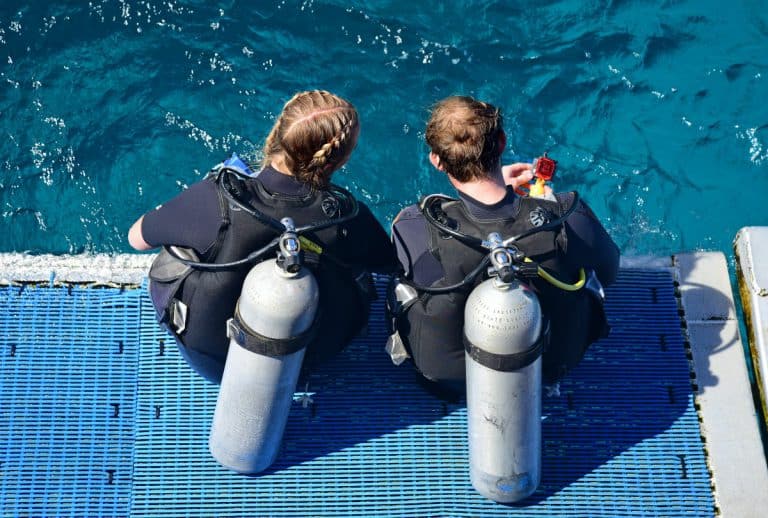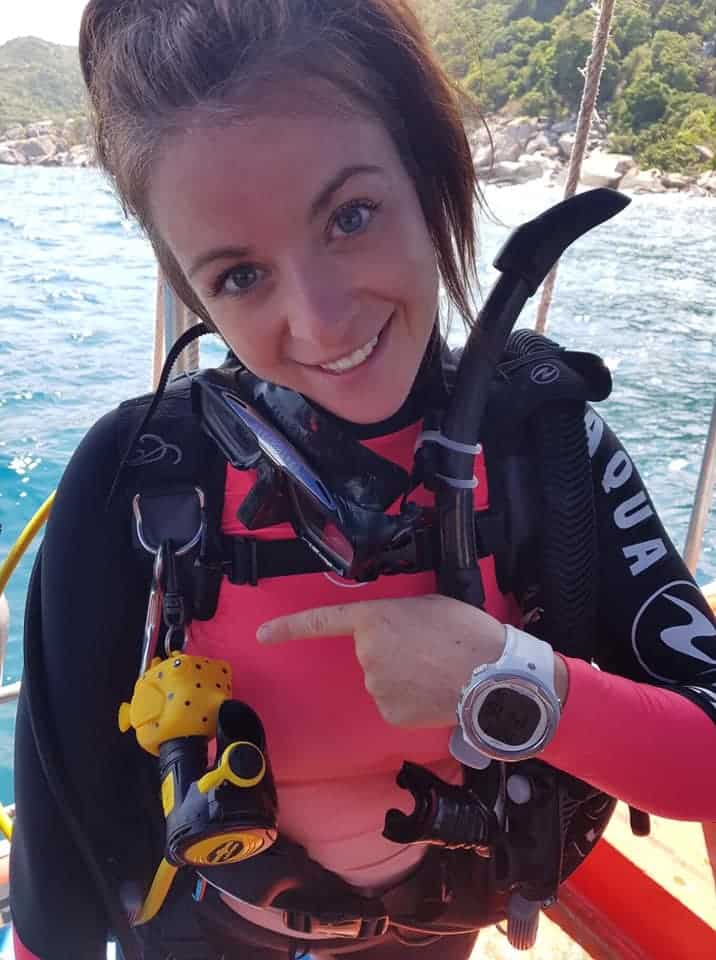Diving is one of the most exciting sports in the world. Its adventurous nature can sometimes make newcomers a little nervous, but over the decades it has proved to be safe.
Despite that, you need to consider your safety and ensure that you’re adhering to what you’ve learned. In this article we will advise all divers with safety tips and ways to reduce risk. There are many protocols that you must stick to if you want to scuba dive safely.
Table of Contents
What Should Divers Do for Their Own Safety?
In short, you will need to carry out safety protocols, stay safe and prepare ahead of your dive.
I always prefer to make a dive plan before setting out, some of these are written down and other steps are in my head that I have practiced throughout my time diving. There are certain things I do before every dive, research that I do before visiting new dive sites and also safety checks that are ingrained into me.
Let’s take a look at ways that you can stay safe and how to ensure you’re making safe choices
Here’s what divers should do for their own safety:
- Pre-Dive Safety Checks
- Plan Your Dive
- Know Your Limits
- No Alcohol
- Stay Fit & Alert
- Check Your Gauge
- Safety Stops
Recommended: Acronyms in Scuba Diving
1- Pre-Dive Safety Checks
Before getting into the water, ensure that you have done all of your safety checks and pre-dive safety processes. One of the best ways to avoid an accident is to ensure that your scuba gear is safe.
If you haven’t used your equipment for a while then it is worth trying it out in a pool beforehand, the same goes with rental gear. Try it out and make sure you’re comfortable, if there’s any issues with it then you will know in time and it’s also great to get peace of mind.
You may have heard of the acronym BWRAF- I talked about a tip to remember this one in my Scuba Acronym article.
Carry out this safety check before scuba diving, you will need to do this with your buddy.
- B – BCD – Inflate and deflate your BCD before leaving for your dive. Check the oral and power inflator work.
- W – Weights – Have you got enough weights for your weight belt? Familiarise yourself with the quick release system.
- R – Releases – Are all straps fastened and the right length? Have your dive buddy check that your cylinder band is attached safely. You can check where your releases are and how to undo them as each person has a slightly different setup,.
- A – Air Supply – Have you got enough air? Have it turned all the way up and breathe through your dive buddy’s regulator and vice-versa to check all is working okay.
- F – Final Check – Do a visual check before you go scuba diving. You need to make sure that you both have your mask and fins. Also anything else that you may need.
What should divers do for their own safety ? These checks are some of the integral actions that need to be taken. You would have been taught these as part of PADI. Also, SSI will also have their own safety check procedures that carry out similar measures.
2- Plan Your Dive
Preparation is key even when it comes to scuba diving. If you’re going to a new dive site then be sure to do some research and ask fellow divers that may know the best route to take.
You could find out how to avoid certain currents, obtrusive rocks and avoid busy spots.
If you’re going with a team of divers then you can plan it together, who will be where and the route that you are taking, that way you can be at hand to help if needed.
3- Know Your Limits
Diving is a safe sport if you’re being careful. Scuba Divers that are participating in the sport with ego could get themselves into trouble.
Know your limits, don’t run before you can walk or in this case don’t deep dive before… well before you are comfortable and have been certified to do so.
Also something I’d like to point out is that your limits aren’t just physical, they are mental. If you get into a position or a dive location you haven’t been before, things can soon change. Don’t fear, but do be mindful of this and remain in your capabilities.
If you wish to go deeper or to a trickier dive site, then first dive consistently and get the years of experience. Make sure that you do not exceed the maximum depth that you are meant to dive.
Ensure you are fit enough, if the area is too testing then maybe you give that site a miss. If you are under the weather then postpone your scuba diving trip until you’re better.
4- No Alcohol
It goes without saying- but do not drink and dive.
No, seriously though- you cannot dive under the influence nor should you be out all night before either.
As tempting as it may be to party if you are living the island life, your diving is a number one priority. You’re safety depends on it and so do others.
Make sure that you do not stay out drinking or turning up to the dive hungover or still under the influence.

5- Stay Fit & Alert
As briefly discussed, you want to be alert and ready to go. If you’re ill or not up to the task in-hand then postpone the dive, it’s not worth risking.
I believe that it’s super-important for all divers to remain fit too. This doesn’t mean just diving but to also take part in other sports and fitness activities. This can help improve your diving skills, although I’d encourage you not to exercise too close to going underwater as you do not want to risk decompression sickness.
Make sure you’re feeling physically good before endeavouring out on your deep blue adventure.
Read some of my tips on how divers can stay fit and improve their skills in doing so.
6- Check Your Gauges
Something that should be obvious, but too often people can forget to do this.
Check your air and also check your dive computer. Make your dive buddy aware when you have half of your air left, when you get to the final third of your air supply, make sure that you designate that for your journey back to the surface, which leads me onto my next point.
7- Safety Stops
Again, I don’t want to teach divers to suck eggs but after much of my research many of the accidents come from faulty equipment and negligence. Two things that can be prevented by checks- during your ascent be sure to do your safety stops.
You shouldn’t ascend faster than 30ft per minute. Give the nitrogen time to dissolve instead of being absorbed into the bloodstream and subsequently creating bubbles.
Always do the essential 3-minute safety stop at 15ft too. Safety stops are integral to scuba diving and are one of the first things we learn but I thought that it’s worth mentioning as sometimes people may abandon key scuba diving rules such as this one.
Avoid DCS or Air Embolism by inserting the much-needed safety stops and other processes when diving.
8- Scuba Diving for Kids
If you are taking kids scuba diving then you will obviously have to bear different tips in mind. They can’t dive as deep and can’t dive.
Scuba diving kids must dive with a professional.
Scuba gear and equipment will also be different for children of different ages. If you are taking a kid scuba diving then please make sure that you check the separate children guidelines for diving, read up on more at PADI here.
Recommended: What Age to Scuba Dive?
Our Scuba Dive Safety Tips
When you learn diving you’re constantly given tips and ways to minimise danger. As exciting and thrilling as the sport is, it has been meticulously designed to lessen risk and maximise enjoyment.
Something else worth a mention is to know emergency numbers, if you are abroad then you may not be as familiar during your holiday scuba dive- make sure that you note it down and remember it.
There are many other safety tips for diving but I have gone through ones that I feel are vital and can sometimes be easily forgotten by many divers.
Enjoy your diving and ensure that you always refresh your memory on the latest diving criteria or take a PADI ReActivate course before carrying out your adventure.
Happy Scuba Diving!

